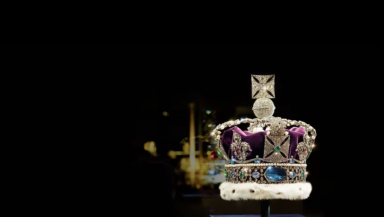
It is 70 years since our last coronation, and the United Kingdom today is a very different nation. The social and cultural changes are such that our predecessors all those years ago would have difficulty in recognising the place. The UK is no longer a nation where the cultural significance of Christianity holds sway. Yet the coronation, apart from a few minor changes, remains essentially a Christian ceremony.
A new king submits to the King of Kings
King Charles III will be crowned in Westminster Abbey where Justin Welby, the Archbishop of Canterbury, will anoint him with holy oil from Jerusalem symbolising the outpouring of the Holy Spirit. While this is happening the choir will sing 'Zadok the Priest', an anthem drawn from the anointing of Solomon in I Kings 1. This moment is deemed so sacred that it will take place behind a screen out of the view of the people over whom Charles III reigns. The symbolism of a leader submitting to God and who vows to govern under God's oversight is very powerful.
At the start of the service a young chorister will welcome King Charles to the abbey 'in the name of the King of kings'. To which Charles will respond, 'In his name, and after his example, I come not to be served but to serve.' Our late Queen epitomised the type of public service the King wishes to follow. She steadfastly, even sacrificially, performed her duty through an unrelenting round of obligations. The 'overarching theme' of the coronation will be that of 'loving service', in emulation of that offered by Jesus.
The first gift the King will receive is a Bible presented by the Moderator of the General Assembly of the Church of Scotland. The words, spoken by the Moderator, sets the word of God above all human laws: 'Sir, to keep you ever mindful of the law and the Gospel of God as the Rule for the whole life and government of Christian Princes'. To accept the gift is for the King to recognise its authority and to accept that constitutionally there should not be any attempt by human authorities to overrule it.
A Christian coronation for a country abandoning Christianity
In the coronation liturgy King Charles will take a vow to maintain 'the doctrine, worship, discipline and government' of the Church of England. There are some, particularly those influenced by the American understanding of the separation of church and state, who find this melding of the two indefensible. Baptist theologian Nigel Wright defends the vow, arguing that while Charles will be head of state for all of the UK, the CofE is the established church of only one constituent part and affects only that minority belonging to the CofE.
This will be a deeply Christian ceremony to install the head of state of an increasingly multicultural country which is progressively turning from Christianity. A 2018 survey found that 43 per cent of the population rarely if ever attend a religious service of any kind. Even the Church of England admits that just 1.5 per cent of the English population attend one of its weekly services.
Some evangelicals see the coronation as an opportunity for mission. Hope Together, a charity dedicated to evangelism, has produced a series of resources suggesting that the coronation is 'an ideal time for us as the church to point to the kingship of Jesus, the ultimate King of Kings'. The CofE states: 'The Coronation weekend presents a unique missional opportunity for the Church to reach out, gather together with those we know, and establish new links and relationships.'
How realistic are these aims? Throughout the twentieth century successive archbishops saw the coronation as an opportunity to reawaken the latent spirituality of the people. We live with the failure of successive coronations to have any lasting spiritual impact on the people of the UK. The purpose of the coronation is constitutional, not evangelistic. Just as the funeral of Queen Elizabeth II was a deeply moving and Christian ceremony but had nothing more than a fleeting impact on the spiritual condition of the nation, we should not expect this ceremony to be any different.
It can be appreciated by all
Will the coronation, a profoundly religious ceremony, be anything more than a spectacle celebrating tradition and ritual, a nationwide exercise in nostalgia? Why should the UK be the only monarchy left in Europe which retains a Christian coronation? Surprisingly there is little popular outcry concerning the Christian nature of the ceremony, apart from the usual suspects on social media.
The meaning of the coronation is undoubtedly different for those who lack a living relationship with Jesus, yet it is meaningful nonetheless. Non-Christians are quite capable of appreciating the coronation on its own terms, accepting it for what it is. Jews, Muslims and Hindus will take part without quibble, glad to be acknowledged as part of the nation. The first reading, from Colossians 1:9ff, will be by our Hindu prime minister. The fact that our new King is a confirmed Anglican and takes the significance of the ceremony very seriously can be accepted and admired whatever your personal religious affiliation.
We are all able to appreciate the significance of religious ceremonies where we do not share the theology of the service. Are there many Protestants who would not acknowledge the seriousness and sincerity of a couple getting married according to Roman Catholic rites? We can appreciate the significance of an act without accepting its underlying structure. The history, symbolism, and importance of this unique ritual can be and, indeed, are significant for all, regardless of faith.
Campbell Campbell-Jack is a retired Church of Scotland minister. He blogs at A Grain of Sand.













